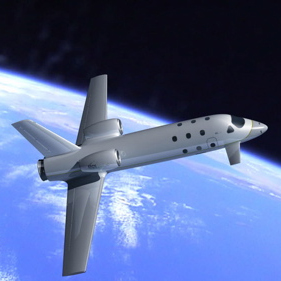Marc Newson has designed the cabin (and, we suspect, had a hand in the exterior) of the Astrium space tourism jet, which was launched at the Paris airshow earlier this summer.
The jet is designed to carry four passengers into space on flights lasting just a few minutes, taking off like a conventional aircraft from regular airports and switching to rocket mode once airborne.
Here are all the facts from EADS Astrium, the company building the jet:
--
Paris, 13 June 2007 - Astrium has unveiled a revolutionary new vehicle for space tourism at a special VIP event in Paris ahead of the Le Bourget Airshow. This business jet sized vehicle is designed to carry four passengers 100 km up into space giving more than three minutes of "zero G" or weightlessness. Guests at the Paris event were shown a full sized mock-up of the forward section of the revolutionary craft including its Marc Newson designed cabin.
Flight phase
The Astrium space jet will take off and land conventionally from a standard airport using its jet engines. However, once the craft is airborne at an altitude of about 12 km, the rocket engines will be ignited to give sufficient acceleration to reach 100 km. In only 80 seconds the craft will have climbed to 60 km altitude.
The highly innovative seats balance themselves to minimize the effects of acceleration and deceleration, ensuring the greatest passenger comfort and safety. The rocket propulsion system is then shut down as the ship’s inertia carries it on to over 100 km, where passengers will become one of the very few to experience zero gravity in space.
The pilot will control the craft using small rocket thrusters enabling passengers to hover weightlessly for 3 minutes and to witness the most spectacular view of Earth imaginable. After slowing down during descent, the jet engines are restarted for a normal and safe landing at a standard airfield. The entire trip will last approximately an hour and a half.
Astrium is proposing the one stage system as it is considered the safest and most economical to operate. If development begins in 2008, a first commercial flight would be possible by 2012.
The development of a new vehicle able to operate in altitudes between aircraft (20km) and below satellites (200 km) could well be a precursor for rapid transport ‘point-to-point’ vehicles or quick access to Space - opening up previously unexplored territory. Its development will contribute to maintaining (and even enhancing) European competences in core technologies of Space Transportation.
As single industrial prime contractor for Ariane 5, main European contributor to the International Space Station and as a wholly owned subsidiary of EADS, Astrium has the necessary expertise and know-how for manned space flight.
Financing of the project
As it is a commercial project, private capital will be the main source of funding. The financial envelope, which will be around one billion euros, could be completed by refundable loans and by regional development funding. Return on investment will come from operations of vehicles for the emerging and promising market of suborbital space tourism. The cost per flight per passenger would be around €150,000 to €200,000.
Timetable
From now until the end of the year, Astrium and the Marc Newson team will be finalising the design, and consolidating industrial and financial partnerships in readiness to launch the project by 2008.
About Astrium
Astrium, a wholly owned subsidiary of EADS, is dedicated to providing civil and defence space systems and services. In 2006, Astrium had a turnover of €3.2 billion and 12,000 employees in France, Germany, the United Kingdom, Spain and the Netherlands.
Its three main areas of activity are: the business units Astrium Space Transportation for launchers and orbital infrastructure, and Astrium Satellites for spacecraft and ground segment, and its wholly owned subsidiary Astrium Services for the development and delivery of satellite services. EADS is a global leader in aerospace, defence and related services. In 2006, EADS generated revenues of €39.4 billion and employed a workforce of more than 116, 000.
About Marc Newson (above)
Named by Time Magazine as one of the 100 most influential people in the world, Australian born designer Marc Newson's aesthetic vision and uncompromising originality have won him the highest international acclaim. Working across a broad spectrum of disciplines, Newson has created furniture, interiors, timepieces, objects of all sorts, sculptural work -as well as major projects in the transportation industry.
As Creative Director of Qantas Airways, he has been responsible for the design of their entire fleet including the Airbus A380. His clients include many of the largest and best-known companies in the world.

